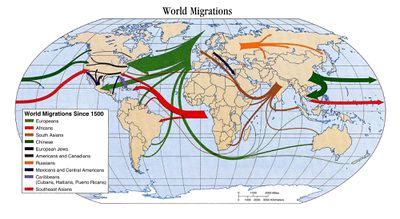ISSS608 2016-17 T3 Assign Group5 Immigration Discussion
|
|
|
|
|
|
|
|
Discussion
What has the audience learned from your work? What new insights or practices has your system enabled? A full blown user study is not expected, but informal observations of use that help evaluate your system are encouraged.
Our dashboard provides a powerful tool for data exploration and analysis, whether in the hands of a novice or a migration expert. Leveraging on the power of R and Shiny, users can test various theories and intuitions in their study of migration flows with relative ease. Through concretizing the distillation of our data science workflow into a data visualisation dashboard, we have not only created an app for exploring the determinants of migration, but we have also subtly guided our users to explore migration in a way that is structured and methodologically consistent.
Further avenues of extending our work:
- Take into account factors relating to the relative ease of migration such as the distance between countries, availability and accessibility of transport, and openness and closeness of source and destination countries to migration. As a moderating factors, they might influence the difficulty in which migrants might travel to nearby countries to retain links to their homeland. Adding this extra layer would provide extra depth into understanding the migration process.
- Our visualization and model is well suited for global trade or tourism as it is characterized by flow between countries with various characteristics. It would also be interesting to study both trade and migration together by comparing trade flows and migration flows.
- Implement a panel data econometrics regression model as an extra feature to study migration flows as from a panel data perspective.
- We will like to thank the R community for constantly developing libraries that made R the wonderful monster that it is today.
Credit
Special thanks go out to Matt Flor who develops the chorddiag package who so kindly added the clickAction functionality upon our request. It is because of him that we are able to link the chord diagram to the parallel coordinates plot.
We thank Nathan Yau’s Flowing Data blog for providing a good overview of visualisation work already done which allowed us to kick start our research and provide us with a stream of references and data visualisation inspirations.
We also thank Google, Stackoverflow and Github for the existence of knowledge sharing communities and wonderful ease at which institutional knowledge for coding in R could be found with the right query.
Last but definitely not least, we thank Prof Kam Tin Seong especially for introducing us to the world of visual analytics and his guidance and advice on how we could approach the visualisation of the migration flows.
Reference
All the World's Immigration Visualized in 1 Map. (2016, December 06). from http://metrocosm.com/global-immigration-map/
Blog, G., Jain, K., Gupta, A., Gupta, D., & Jain, S. (2016, March 25). How to perform feature selection (pick imp. variables) - Boruta in R? Retrieved August 06, 2017, from https://www.analyticsvidhya.com/blog/2016/03/select-important-variables-boruta-package/
Companion to Applied Regression [R package car version 2.1-5]. (n.d.). Retrieved August 06, 2017, from https://cran.r-project.org/web/packages/car/index.html
DT: An R interface to the DataTables library. (n.d.). Retrieved August 06, 2017, from https://rstudio.github.io/DT/
Faist, T. (2012). Migration. John Wiley & Sons, Ltd.
Flexdashboard: Easy interactive dashboards for R. (n.d.). Retrieved August 06, 2017, from http://rmarkdown.rstudio.com/flexdashboard/
Global bilateral migration database http://data.worldbank.org/data-catalog/global-bilateral-migration-database
Grigg, D. B. (1977). EG Ravenstein and the “laws of migration”. Journal of Historical geography, 3(1), 41-54.
Human Trafficking Flow Map. (n.d.) from http://dataviz.du.edu/projects/htc/flow/
Hofstede’s Cultural Dimensions dataset https://geert-hofstede.com/national-culture.html
Kursa, M. B., & Rudnicki, W. R. (2010). Feature selection with the Boruta package. J Stat Softw, 36(11), 1-13.
Lesson 6 Use reactive expressions. (n.d.). Retrieved August 06, 2017, from https://shiny.rstudio.com/tutorial/lesson6/
Matt Flor. (2017, July 24). Mattflor/chorddiag. Retrieved August 06, 2017, from https://github.com/mattflor/chorddiag
MigrationsMap.net. (n.d.)., from http://migrationsmap.net/#/USA/arrivals
Peoplemovin. (n.d.), from http://peoplemov.in/
Polity IV measures http://www.systemicpeace.org/polityproject.html
Remittance Flows 2015. (n.d.). Retrieved August 06, 2017, from http://www.torre.nl/remittances/#/?direction=sent&country=
Richmond, A. H. (1988). Sociological theories of international migration: the case of refugees. Current Sociology, 36(2), 7-25.
Systems, I. (n.d.). Ravenstein's Laws of Migration., from http://www.harpercollege.edu/mhealy/migrat/xp/mgraven.htm
T. (2017, June 25). Timelyportfolio/parcoords. Retrieved August 06, 2017, from https://github.com/timelyportfolio/parcoords
Tobler, W. (1995). Migration: Ravenstein, thornthwaite, and beyond. Urban Geography, 16(4), 327-343.
Wallace, S. P. (2015, June 21). The Flight of Refugees Around the Globe. Retrieved August 06, 2017, from https://www.nytimes.com/interactive/2015/06/21/world/map-flow-desperate-migration-refugee-crisis.html?_r=0 and https%3A%2F%2Fflowingdata.com%2F2014%2F01%2F09%2Fa-visual-exploration-of-refugee-migrations%2F
Where We Came From and Where We Went, State by State. (2014, August 14). from https://www.nytimes.com/interactive/2014/08/13/upshot/where-people-in-each-state-were-born.html#Utah
World Development Indicators represent economic indicators http://data.worldbank.org/data-catalog/world-development-indicators
Wrapper Algorithm for All Relevant Feature Selection [R package Boruta version 5.2.0]. (n.d.). Retrieved August 06, 2017, from https://cran.r-project.org/web/packages/Boruta/index.html
Yau, N. (2012, February 07). Animation shows national migration patterns. from https://flowingdata.com/2012/02/08/animation-shows-national-migration-patterns/
